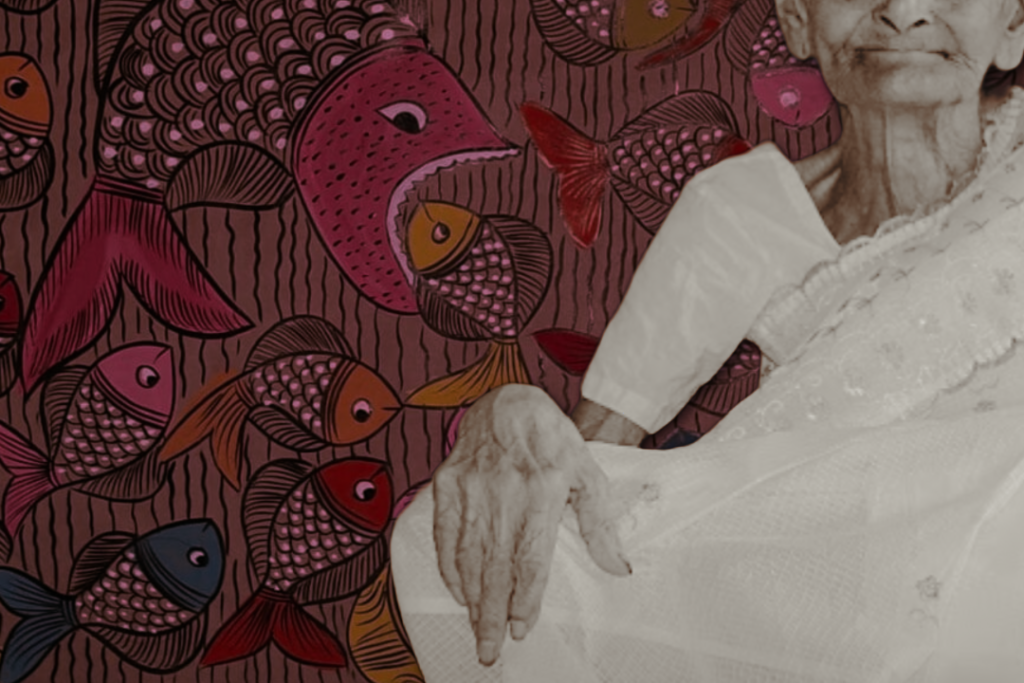content note for sexual violence
.
My grandmother sits on the verandah, her legs spread out, descaling fish, one after another, after another, as the sunlight filters through the latticed-designed railings. I sit watching her, as she picks a fish, cuts through the middle, scrapes the scales, and now and then, sprinkles water on its shiny skin. Ilish, Hilsa, must not be washed too much, she says. I try to say, that’s how I feel after I make love in secret at the several rented hotels across the sprawling city. But I cannot. She would get hopeful, I know, and ask, Who’s she?
But I would have nobody to name. A—, R—, N—? Who do I name? They are all men, a few of them older than me, that have snuggled against my deep-set collarbones, and cried, like the rain falling—as in that song, এমন দিনে তারে বলা যায়/এমন ঘনঘোর বরিষায়।, which my Dida often hums while frying mourola maach. No, this is not a short story, believe me. Hold me, like those young boys do in bed, panting, their breaths condensing into little water drops against my skin, and I will delve into the intricacies of translation, the (im)possibility of doing so.
How do I tell Dida? A woman, who had, even in her happiest moments, always narrated those same stories of how her father had crossed the borders from East Pakistan, or how her marriage happened in complete blackout during the 1971 war, she was then only a child of eighteen. (People would identify this as her reaction to the subcontinent’s long Partition.Perhaps, it is so, but I think that imaginary homeland was her Shambhala. Something she had held on to as her skin wrinkled, her fingers gnarled, knees snapped! My Shambhala is the other-side of language. No, not silence, but meaning, fluid, playful, sexy. Am I heading there? Where is the way?)
Hadn’t you loved anybody? I had asked her, a few years ago. Oh, I did, she replied, instantly spinning the most extraordinary fairytale that would have put dear Cinderella to shame, and even now, sometimes, succeeded in putting me to sleep. Her lover’s name, she said, had to be discovered by solving a common Bengali riddle. The answer to the riddle was Amra, a type of sour fruit. She was obviously bluffing, but that didn’t stop us from sharing a hearty laughter about the story. The first time it was shared we cried laughing, and continued to laugh every time it was retold, until Amra, Dida’s yearning for him, and the possibility that he might still be alive got too real. It hung over us like a ghostly presence, an unbearable memory, always there but beyond naming, hidden under a maze of riddles.
It was funny! But how could I tell Dida about my lovers, not fictional beings, but real, bleeding, orgasming, crying individuals; more so, how do I tell her about myself? Is there a way by which the English, chic, labels of LGBTQIA+, so sonorous you could almost taste it, and the politics of pronouns can be translated into Bangla? No, not in Bangla, but in this space between a grandmother descaling fish on the verandah, and her grandson, or perhaps a granddaughter, a grand-trans* someone; britha chesta, there is no word for us, I give up. Between us. How can I translate myself and present it to her—so that she may know, she may see me more clearly, and understand why I choose to stay away from home, refuse to return even during the annual homecoming of the autumnal Goddess, why I wear aalta, an orna around my flat chest, why I sit crosslegged, and why I remain silent? How do I tell her that at night everyday I wake up, sweating profusely, remembering that time my brother pushed his … forcefully, gaping my … and I bled. Or about the absolute hopelessness in my father’s eyes whenever he sees me and my mother’s perennial efforts to satiate him. Or about those times, the boys in my school pressed my crotch and theirs, and back, and again, to see … ? Is there a Bangla for me, for all this, for the scars deeply etched against my thighs and back?
You see, I can’t say I am somokami, rupantarkami, etc., there is no kamona in me to become something, someone—to change as per a definite teleos, I am what I am, I flow like a river, a nodi, a nodi is not a somudra-kami. But I am at the same time, both of its banks! Yet I am not a hijda, I can’t appropriate that experience, or a kothi, or a Chitrangada, the last one is excessively poetic, forgive me Tagore. But thank God, grammatically at least Bangla is genderless, and for now, I seek refuge there; tired of changing my settings from he/him, he/they, to he/she/they, or xe/xir, every alternate day on Grindr or Instagram.
I sit and watch as Dida descales the fish, carving it in triangles, elongated at the end, sprinkling water. My temples ache. I search for words, gasp like the fishes swimming under the rivers, dangling in the liminal spaces of language. Between the genderless syntax of a South Asian language that your grandmother speaks, and the forward-slashes of the master’s language that has given you access to the available political vocabulary to chisel your identity; here, in India, both these exist today in a tense relationship with Hindi, the projected majoritarian tongue. Did these fish die because they couldn’t translate themselves? Perhaps. Did Aamra have to be hidden inside a riddle because my grandmother, fish-eyed, couldn’t name her desires, and say really who she loved? I don’t know. I move near her, touching the red flesh of the fish, Ki norom, tatka. Khete khub shaad hobe go. She winks, Ta hobe. Jaan aache ki na (So soft, and fresh. It would taste delicious. She winks, Indeed so. For it has life, no?).


